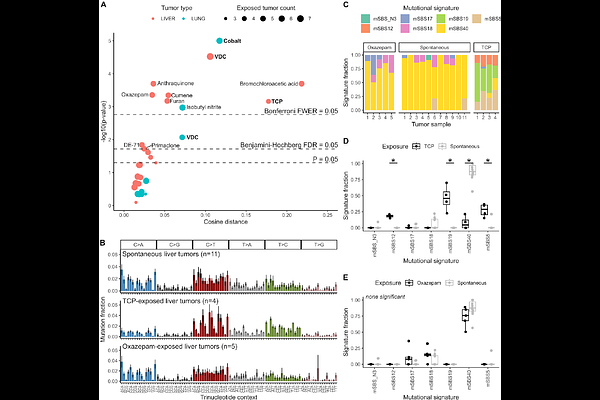A signature-agnostic test for differences between tumor mutation spectra reveals carcinogen and ancestry effects

A signature-agnostic test for differences between tumor mutation spectra reveals carcinogen and ancestry effects
Hart, S. F. M.; Alcala, N.; Feder, A. F.; Harris, K.
AbstractMutational signatures contain valuable information about the mutational processes shaping cancer genomes. However, despite dozens of tools to identify signatures in cancer samples, there is not an established metric for statistically comparing mutational signature results and quantifying the overall significance of differences among complex mixtures of signatures. To close this methodological gap, we demonstrate that a signature-agnostic metric for measuring differences in mutation spectra - the aggregate mutation spectrum distance permutation method (AMSD) - can discover differences overlooked by signature analysis. First, we reanalyzed a study of carcinogen exposure in mice, identifying statistically significant shifts in mutation spectra caused by eleven of twenty tested carcinogens. Only three carcinogens were previously reported to induce distinct mutation signatures, suggesting that many carcinogens perturb mutagenesis by altering the composition of endogenous signatures rather than introducing unique signatures. Next, we used human tumor data to determine whether patient ancestry has a measurable impact on tumor mutation spectra, finding significant ancestry-associated differences across ten cancer types: for example, Africans have elevated SBS4 in lung adenocarcinomas, East Asians have elevated SBS16 in esophageal and liver cancers plus elevated SBS10a/b in uterine and colorectal cancers, and Europeans have elevated SBS17b in esophageal cancers plus elevated SBS2/13 in bladder cancers. These examples suggest that AMSD is a robust tool for detecting differences among tumor mutation spectra, complementing signature-based approaches and enabling the discovery of environmental and genetic influences on mutagenesis in large datasets.